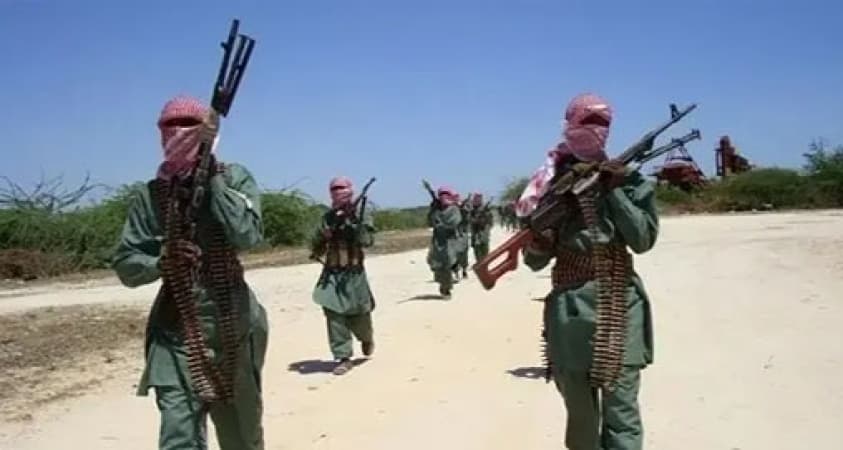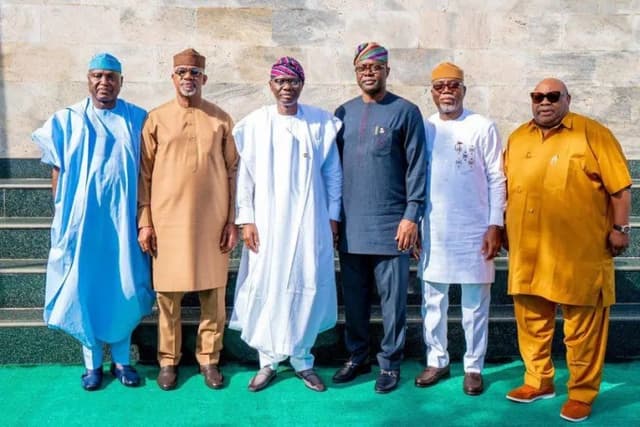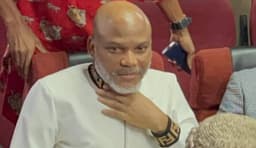
Lakurawa bandits
As I sat with the man I had come to see, two Lakurawa fighters approached us. They questioned my identity, and the man quickly introduced me as his brother, a trader from Sokoto.
One of the fighters switched to Arabic, demanding my name and testing me with rapid exchanges. My responses eased his suspicion; he shook my hand, praised my fluency, and even touched my beard, saying it reflected religious devotion.
He then seized my phone, ordered me to unlock it, and condemned the music he found as ‘unholy.’ I explained that the phone was newly purchased, but he still Instructed me to remove the memory card, which he destroyed, warning that he would have whipped me had he thought I intentionally kept such items.
Noticing my cufflinks, he accused my companion of previously buying him a fake pair and, without hesitation, lashed him with a whip, calling him ‘dan rainin wayo’ (someone insolent enough to pretend to be clever).”
This firsthand account from a GGA Nigeria local fixer in Magoho community in Tangaza local government area of Sokoto state is not merely a story of a narrow escape. It offers a stark window into the suffocating reality of life under Lakurawa’s rule – an environment defined by coercion, suspicion, and unrestrained violence.
In a single encounter, one sees the group’s authoritarian methods: relentless monitoring, ideological probing, enforcement of an extreme moral code, and sudden punitive actions that leave residents perpetually terrified.
A simple memory card can be branded “unholy,” and a cufflink can trigger a whipping. This is the grim reality of Lakurawa’s harsh administration across several communities in Sokoto and Kebbi States – an order built on intimidation, religious manipulation, and the unchallenged power of armed men.
For the past year, GGA Nigeria has been gathering data on Lakurawa, reportedly an offshoot of al-Qaeda operating primarily in northwest Nigeria, with reported footprints in the Northeast, Northcentral regions, and parts of Niger Republic.
Between October and November 2025, GGA Nigeria undertook field missions to Katsina, Kebbi, Sokoto, and Zamfara States. During this period, GGA Nigeria’s researcher interviewed a mid-ranking member of the group, while the organisation’s local fixer had multiple encounters and interactions with fighters in the Mastigi and Magoho areas of Sokoto State.
Following a year-long effort to build rapport with elements of the group, the fixer gained exclusive access to Lakurawa’s 2025 Maulid celebration in a forested area of Kebbi State in November.
Over four days, he conducted several interviews with a senior commander, had discussions with the group’s most senior member in Nigeria, was introduced to the group’s founder, interacted with numerous fighters, and observed their routine activities. These insights form part of GGA Nigeria’s forthcoming report on the group.
For several years, residents of border communities in Kebbi and Sokoto States have endured a violent system of control disguised as the enforcement of Sharia.
Many villagers now express deep regret over ever accommodating the group. Yet, at the time of Lakurawa’s arrival, resistance was impossible: the group portrayed itself as a moral force, and state security actors were conspicuously absent.
Religion as political technology: how Lakurawa captures communities.
Several communities initially accepted the group because Lakurawa portrayed itself both as a defence against bandits and as an enforcer of Islamic morality.
To further win local trust, the fighters engaged in activities presented as charitable or reformative – mediating disputes, offering small economic assistance, and raiding shops to destroy cigarettes and alcohol, which they labelled un-Islamic. Shop owners whose goods were destroyed received stipends ranging from N10,000 to N100,000 as compensation.
Members also engaged in Islamic proselytising, encouraged piety, urged young men to grow their beards, and discouraged the wearing of t-shirts and jeans. Local clerics were replaced on the grounds that they lacked sufficient religious authority, with beardless clerics deemed unfit to lead worship.
“When they first came to our village, three months ago (July 2025), we received them with open arms because of how they presented themselves. They were not violent and said they were there to ensure that Islam was practised.
We would sit with them, and they would gist us about their intentions, saying they would be going from village to village to destroy any un-Islamic practices or ways of life,” a resident of Sitti community in Tangaza local government area recounted.
When Lakurawa imposed zakat, many complied because zakat is a recognised religious obligation, especially since the group initially demanded only ten per cent. But shortly after, the group altered the rules – first dictating the quantities to be paid, then progressively seizing entire livestock herds.
Those who resisted were subjected to punishments ranging from execution to kidnapping. Hostages were taken to forest camps and released only after ransom payments or surrendering their cattle.
As part of its interpretation of ‘Sharia,’ Lakurawa routinely inspected people’s phones for ‘unholy’ content. SIM cards and memory cards were destroyed on the spot, while Mohawk haircut and music triggered beatings.
The severity of punishment for music depended on the type of songs found: Hausa songs attracted 50 lashes per song, while foreign or Afrobeat songs resulted in 100.
“They opened my phone and found many songs. So, I was going to be whipped for each song. A few of them pleaded on my behalf because, according to them, I was nice to them and always offered them water and fura da nono (millet porridge mixed with milk). So, their leader said they would be lenient and said I should be lashed 150 times for all the songs combined,” another Sitti resident explained.
Communities now openly say that Lakurawa is more oppressive and dangerous than the bandits they claim to protect them from, whose reign of terror across northern Nigeria is associated with killings, kidnapping, rape, armed robbery, and the destruction of livelihoods.
A resident of Magoho stated, “When bandits attack, they only kidnap people and release them after ransom is paid. They have no business going through your phone, whipping you for having music in your phone or even enforcing dress code.”
A threat consolidating in silence
Lakurawa continues to expand with minimal resistance. The group currently maintains a nominal or permanent presence in at least 19 local government areas and 82 villages across Kebbi, Sokoto and Zamfara States, with most of its footprint in Kebbi.
The group repeatedly asserted, in interviews conducted by GGA Nigeria, both directly and through its fixer, that its sole objective is the entrenchment of Sharia as practised by Sheikh Usman dan Fodio, founder of the Sokoto Caliphate.
It Insists that it does not target civilians and only confiscates property from those who refuse to pay zakat.
According to the group, those who refuse are first admonished with Qur’anic instructions, but force is applied if they remain defiant. Yet, the sharp contrast between these claims and the group’s conduct exposes Lakurawa’s strategy of exploiting religion as a smokescreen for predatory violence.
For instance, they also forcibly seize people’s oxen, including when they encounter farmers actively using them to plough their fields. This practice has severely undermined agricultural output for 2025 and poses a significant threat to food security in 2026, particularly in Kebbi State, as the loss of oxen leaves many households able to cultivate only minimal portions of their farmland.
The Nigerian government’s inability to protect rural communities has created fertile ground for the group to deeply entrench itself, recruit followers, and extract resources – capacity that ultimately fuels further confrontation with the state.
The country’s porous borders, the absence of security oversight across vast forested zones of the northwest, and strained relations between ECOWAS and the Alliance of Sahel States have further undermined cross-border cooperation.
These tensions have weakened intelligence sharing, joint operations, and the right of hot pursuit between Nigeria and Niger, giving Lakurawa room to grow.
Lakurawa has remained largely under the radar because, unlike Boko Haram factions in the Northeast, it has not conducted major attacks on security forces or caused mass civilian casualties that would draw national headlines.
Nonetheless, the group has been steadily expanding its arsenal, raising revenue and absorbing recruits – including some former bandits and individuals from Mali – creating conditions for a dangerous escalation.
The recent abduction of the Deputy Speaker of the Kebbi State House of Assembly – who regained his freedom only after a ransom of N200 million was paid, including a portion delivered in CFA francs – underscores the Lakurawa’s capacity to target high-profile individuals and their expanding operational reach.
The threat Is active, growing, and waiting for the moment when it can fully erupt, unless Nigeria actively and urgently works to ensure that the threat never materialises.
Malik Samuel is a senior researcher at Good Governance Africa-Nigeria. Before joining GGA, he was a researcher with the Institute for Security Studies, specialising in the Boko Haram conflict in the Lake Chad Basin Region.
Malik also worked as a conflict researcher with Amnesty International Nigeria. He was also a Médecins Sans Frontières/Doctors Without Borders field communications manager in Northeast Nigeria.
Before that, he was an investigative journalist at the Abuja-based International Centre for Investigative Reporting.
Malik holds a Master’s degree in Conflict, Peace, and Security from the Universitat Oberta de Catalunya and the United Nations Institute for Training and Research (UNITAR). (The Guardian)



























NEWS EXPRESS is Nigeria’s leading online newspaper. Published by Africa’s international award-winning journalist, Mr. Isaac Umunna, NEWS EXPRESS is Nigeria’s first truly professional online daily newspaper. It is published from Lagos, Nigeria’s economic and media hub, and has a provision for occasional special print editions. Thanks to our vast network of sources and dedicated team of professional journalists and contributors spread across Nigeria and overseas, NEWS EXPRESS has become synonymous with newsbreaks and exclusive stories from around the world.